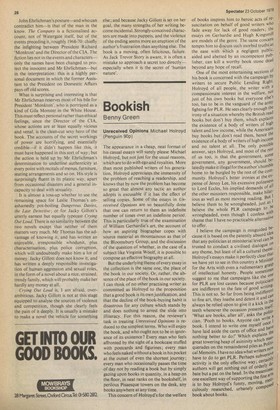Bookish
Benny Green
Unreceived Opinions Michael Holroyd (Penguin 90p)
The appearance in a cheap, neat format of his casual essays will surely please Michael Holroyd, but not just for the usual reasons, which are to do with ego and royalties. More than most published writers of his generation, Holroyd appreciates the immensity of the problem of reaching a readership, and knows that by now the problem has become so great that almost any tactic an author adopts is excusable if it has the effect of selling copies. Some of•the essays in Unreceived Opinions are so beautifully done that one can return to them an indefinite number of times over an indefinite period. This is particularly true of the examination of William Gerhardie's art, the account of how an aspiring biographer copes with source material as mountainous as that of the Bloomsbury Group, and the discussion of the question of whether, in the case of a subject like Virginia Woolf, it is possible to compose an effective biography at all.
But the underlying theme of every essay in the collection is the same one, the place of the book in our society. Or, rather, the absence of the place of the book in our society. I can think of no other practising writer as committed as Holroyd to the proposition that a good book is its own justification, and that the decline of the book-buying habit is disastrous for any culture which stands by and does nothing to arrest the slide into illiteracy. For this reason, the reviewer's task in treating Unreceived Opinions is reduced to the simplest terms. Who will enjoy the book, and who ought not to be in ignorance of its existence? Every man who feels affronted by the sight of a bookcase stuffed with postcards and figurines; every man who feels naked without a book in his pocket at the outset of even the shortest journey; every man who occasionally passes the time of day not by reading a book but by simply gazing upon books in quantity, in a heap on the floor, in neat ranks on the bookshelf, in perilous Pisaesque towers on the desk, any books anywhere at any time.
This concern of Holroyd's for the welfare of books inspires him to heroic acts of resuscitation on behalf of good writers who fade away for lack of good readers; the essays on Gerhardie and Hugh Kingsmill are models of the genre. The same concern
tempts him to discuss such morbid truths as the ease with which a negligent public, aided and abetted by an incompetent Publisher, can kill a worthy book stone dead beyond any hope of recall. One of the most entertaining sections of his book is concerned with the campaign bY writers to secure Public Lending Right. Holroyd of all people, the writer with a compassionate interest in the welfare, not just of his own books but everyone else s too, has to be in the vanguard of the arrnY fighting for PLR. He sees clearly enough the irony of a situation whereby the British read books but don't buy them, which explains the existence of a body of writers of high talent and low income, while the Americans buy books but don't read them, hence the existence of a body of writers of high income and no talent at all. The only possible answer, says Holroyd, and most of the rest of us too, is that the government, some government, any government, should belatedly make it illegal for the author's humble home to be burgled by the rest of the community. Holroyd's bitter ironies at the ex' pense of Jenny Lee, his excessive politeness to Lord Eccles, his implied demands of all the other ministers responsible, make hilar' ious as well as most moving reading. But believe them to be wrongheaded, just as ' believe the whole PLR campaign to .174 wrongheaded, even though I confess with shame that I have no practicable alternative to offer. I believe the campaign is misguided. because it is based on the patently absurd idea that any politician at ministerial level can be trusted to conduct a civilised dialogue 011 any theme, but least of all a cultural theme: Holroyd's essays make it perfectly clear that we have yet to see in this country a Minister for the Arts with even a rudimentary est' of intellectual honesty. People sometinnes suggest to me that campaigns like the .0r1e. for PLR are lost causes because politicians are indifferent to the fate of good writing. This is not so. So far from being indifferent to fine art, they loathe and detest it and the
'
always be relied upon to give it a kick in if teeth whenever the occasion presents itse.!: 'What are books, after all', asks the P°11ti„ cian. 'Pooh to books. Anyone can write book. I intend to write one myself once ; have laid aside the cares of office and ha,_v nothing better to do!' Which explains 07, great towering heap of asininity which M querades on the remaindered piles as Poll', cal Memoirs. I have no idea what writers np:_ have to do to get PLR. Perhaps 5ubvers.1,` activity is the only effective way; certainlY authors will get nothing out of orderly. de: bate but a pat on the head. In the meantirrIrte; one excellent way of supporting the fine a is to buy Holroyd's funny, moving, meed culously researched, urbanely coMPQs book about books.










































 Previous page
Previous page